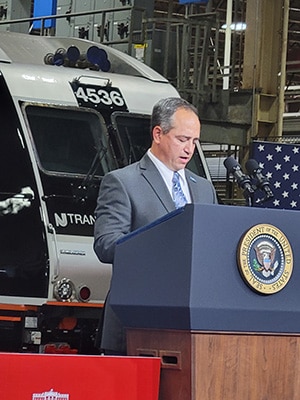New Jersey State Legislative Director Ron Sabol received a big honor March 2 after being elected to lead the influential New Jersey Society for Environmental, Economic Development (NJ SEED) coalition by the group’s trustees and members.

N.J. Sen. Patrick J. Diegnan Jr., chairman of the Senate Transportation Committee who has collaborated with Sabol on a number of legislative initiatives, swore him in. Sabol succeeds James Benton, who presided over the group during the majority of the COVID-19 pandemic, as president of the group.
“Ron is the quintessence of how to get things done. It’s not only about being smart, it’s not only about listening to people, it’s about trust,” Diegnan said. “You could not have a better leader.”
NJ SEED has been in existence for more than 35 years and consists of a diverse coalition of energy providers, environmental consultants, telecommunications firms, residential and commercial development interests, insurance firms, educators, police and firefighters, food manufacturers and retailers, water utilities, chemical industries, pharmaceutical companies and health care advocates. Its purpose is to balance the needs of unionized labor and the business community while being keenly in tune with environmental concerns.
“You can count on me to carry the NJ SEED message, your message, in the work that I do and to the people that I meet,” Sabol said. “I believe in NJ SEED and what we will all accomplish together.”
A main focus of the coalition going forward will be working with New Jersey elected leaders as the state works to effectively allocate federal funds from the Bipartisan Infrastructure Law (formerly the Infrastructure Investment and Jobs Act).
“Ron Sabol is an excellent choice to lead NJ SEED. In his role at SMART, he leads a broad and diverse coalition. He knows how to get people from different backgrounds to work together, which will be crucial to the continued success of NJ SEED,” the New Jersey AFL-CIO said in a statement. “We congratulate Ron on his election and look forward to working with him in his new role.”
Sabol, a member of our union since April 2000, has been president of Local 1447 (Newark, N.J.) since 2005 and became state legislative director in 2016.
“This is a great responsibility and SEED’s influence has been resurging in recent years,” Sabol said. “We are going to be in the middle of a lot of action with the federal money that’s going to be coming into New Jersey and have the chance to set the stage for beneficial and transformative change now and well into the future.”
SMART Transportation Division congratulates Brother Sabol on his new position of leadership!


 New Jersey State Legislative Director Ron Sabol reports that the state AFL-CIO
New Jersey State Legislative Director Ron Sabol reports that the state AFL-CIO 